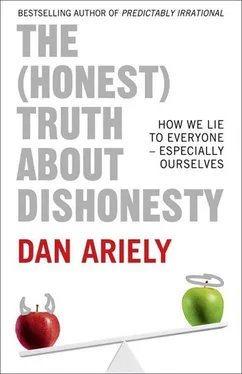Ariely, Dan - The (Honest) Truth About Dishonesty - How We Lie to Everyone – Especially Ourselves
Здесь есть возможность читать онлайн «Ariely, Dan - The (Honest) Truth About Dishonesty - How We Lie to Everyone – Especially Ourselves» весь текст электронной книги совершенно бесплатно (целиком полную версию без сокращений). В некоторых случаях можно слушать аудио, скачать через торрент в формате fb2 и присутствует краткое содержание. Жанр: Старинная литература, на английском языке. Описание произведения, (предисловие) а так же отзывы посетителей доступны на портале библиотеки ЛибКат.
- Название:The (Honest) Truth About Dishonesty: How We Lie to Everyone – Especially Ourselves
- Автор:
- Жанр:
- Год:неизвестен
- ISBN:нет данных
- Рейтинг книги:4 / 5. Голосов: 1
-
Избранное:Добавить в избранное
- Отзывы:
-
Ваша оценка:
- 80
- 1
- 2
- 3
- 4
- 5
The (Honest) Truth About Dishonesty: How We Lie to Everyone – Especially Ourselves: краткое содержание, описание и аннотация
Предлагаем к чтению аннотацию, описание, краткое содержание или предисловие (зависит от того, что написал сам автор книги «The (Honest) Truth About Dishonesty: How We Lie to Everyone – Especially Ourselves»). Если вы не нашли необходимую информацию о книге — напишите в комментариях, мы постараемся отыскать её.
The (Honest) Truth About Dishonesty: How We Lie to Everyone – Especially Ourselves — читать онлайн бесплатно полную книгу (весь текст) целиком
Ниже представлен текст книги, разбитый по страницам. Система сохранения места последней прочитанной страницы, позволяет с удобством читать онлайн бесплатно книгу «The (Honest) Truth About Dishonesty: How We Lie to Everyone – Especially Ourselves», без необходимости каждый раз заново искать на чём Вы остановились. Поставьте закладку, и сможете в любой момент перейти на страницу, на которой закончили чтение.
Интервал:
Закладка:
All of those little acts of repression add up to greater depletion.
Once our participants turned in their essays, we asked them to perform a separate task for a different study, which was the main focus of this experiment. The other task was our standard matrix test.
How did things turn out? In the two control conditions, we found that both the depleted and nondepleted folks showed an equal ability to solve the math problems—which means that depletion did not diminish their basic ability to do the math. But in the two shredder conditions (in which they could cheat), things went differently. Those who wrote essays without the letters “x” and “z” and later shredded their answers indulged in a little bit of cheating, claiming to solve about one extra matrix correctly. But the participants in the shredder condition who’d undergone the ordeal of writing essays without the letters “a” and “n” took the proverbial cake: they claimed to have correctly solved about three extra matrices. As it turned out, the more taxing and depleting the task, the more participants cheated.
What do these findings suggest? Generally speaking, if you wear down your willpower, you will have considerably more trouble regulating your desires, and that difficulty can wear down your honesty as well.
Dead Grannies
Over the course of many years of teaching, I’ve noticed that there typically seems to be a rash of deaths among students’ relatives at the end of the semester, and it happens mostly in the week before final exams and before papers are due. In an average semester, about 10 percent of my students come to me asking for an extension because someone has died—usually a grandmother. Of course I find it very sad and am always ready to sympathize with my students and give them more time to complete their assignments. But the question remains: what is it about the weeks before finals that is so dangerous to students’ relatives?
Most professors encounter the same puzzling phenomenon, and I’ll guess that we have come to suspect some kind of causal relationship between exams and sudden deaths among grandmothers. In fact, one intrepid researcher has successfully proven it. After collecting data over several years, Mike Adams (a professor of biology at Eastern Connecticut State University) has shown that grandmothers are ten times more likely to die before a midterm and nineteen times more likely to die before a final exam. Moreover, grandmothers of students who aren’t doing so well in class are at even higher risk—students who are failing are fifty times more likely to lose a grandmother compared with non-failing students.
In a paper exploring this sad connection, Adams speculates that the phenomenon is due to intrafamilial dynamics, which is to say, students’ grandmothers care so much about their grandchildren that they worry themselves to death over the outcome of exams. This would indeed explain why fatalities occur more frequently as the stakes rise, especially in cases where a student’s academic future is in peril. With this finding in mind, it is rather clear that from a public policy perspective, grandmothers—particularly those of failing students—should be closely monitored for signs of ill health during the weeks before and during finals. Another recommendation is that their grandchildren, again particularly the ones who are not doing well in class, should not tell their grandmothers anything about the timing of the exams or how they are performing in class.
Though it is likely that intrafamilial dynamics cause this tragic turn of events, there is another possible explanation for the plague that seems to strike grandmothers twice a year. It may have something to do with students’ lack of preparation and their subsequent scramble to buy more time than with any real threat to the safety of those dear old women. If that is the case, we might want to ask why it is that students become so susceptible to “losing” their grandmothers (in e-mails to professors) at semesters’ end.
Perhaps at the end of the semester, the students become so depleted by the months of studying and burning the candle at both ends that they lose some of their morality and in the process also show disregard for their grandmothers’ lives. If the concentration it takes to remember a longer digit can send people running for chocolate cake, it’s not hard to imagine how dealing with months of cumulative material from several classes might lead students to fake a dead grandmother in order to ease the pressure (not that that’s an excuse for lying to one’s professors).
Just the same, to all grandmothers out there: take care of yourselves at finals time.
Red, Green, and Blue
We’ve learned that depletion takes away some of our reasoning powers and with them our ability to act morally.
Still, in real life we can choose to remove ourselves from situations that might tempt us to behave immorally. If we are even somewhat aware of our propensity to act dishonestly when depleted, we can take this into account and avoid temptation altogether. (For example, in the domain of dieting, avoiding temptation could mean that we decide not to shop for groceries when we’re starving.)
In our next experiment, our participants could choose whether or not to put themselves into a position that would tempt them to cheat in the first place. Once again, we wanted to create two groups: one depleted, the other not. This time, however, we used a different method of mental exhaustion called the Stroop task.
In this task, we presented participants with a table of color names containing five columns and fifteen rows (for a total of seventy-five words). The words in the table were color names—red, green, and blue—printed in one of these three colors and organized in no particular order. Once the list was in front of the participants, we asked them to say the color of each word on the list aloud. Their instructions were simple: “If a word is written in red ink, regardless of what the word is, you should say ‘red.’ If a word is written in green ink, regardless of what the word is, you should say ‘green.’ And so on. Do this as fast as you can. If at any point you make a mistake, please repeat the word until you get it right.”
For the participants in the nondepleting condition, the list of colors was structured such that the name of each color (e.g., green) was written in the same color of ink (green). The participants in the depleting condition were given the same instructions, but the list of words had one key difference—the ink color did not match the name of the color (for instance, the word “blue” would be printed in green ink, and the participants were asked to say “green”).
To try the nondepleting condition of this experiment yourself, time how long it takes you to say the colors of all the words in the “Congruent Color Words” list*. When you are done, try the depleting condition by timing how long it takes you to say aloud the colors of all the words in the “Incongruent Color Words” list.
How long did these two tasks take you? If you are like most of our participants, reading the congruent list (the nondepleting condition) probably took around sixty seconds, but reading the incongruent list (the depleting condition) was probably three to four times more difficult and more time-consuming.
Somewhat ironically, the difficulty of naming the colors in the mismatched list stems from our skill as readers. For experienced readers, the meaning of the words we read comes to mind very quickly, creating an almost automatic reaction to say the corresponding word rather than the color of the ink. We see the green-colored word “red” and want to say “red!” But that is not what we are supposed to do in this task, so with some effort we suppress our initial response and instead name the color of the ink. You may also have noticed that as you keep at this task, you experience a sort of mental exhaustion resulting from the repeated suppression of your quick automatic responses in favor of the more controlled, effortful (and correct) responses.
Читать дальшеИнтервал:
Закладка:
Похожие книги на «The (Honest) Truth About Dishonesty: How We Lie to Everyone – Especially Ourselves»
Представляем Вашему вниманию похожие книги на «The (Honest) Truth About Dishonesty: How We Lie to Everyone – Especially Ourselves» списком для выбора. Мы отобрали схожую по названию и смыслу литературу в надежде предоставить читателям больше вариантов отыскать новые, интересные, ещё непрочитанные произведения.
Обсуждение, отзывы о книге «The (Honest) Truth About Dishonesty: How We Lie to Everyone – Especially Ourselves» и просто собственные мнения читателей. Оставьте ваши комментарии, напишите, что Вы думаете о произведении, его смысле или главных героях. Укажите что конкретно понравилось, а что нет, и почему Вы так считаете.












